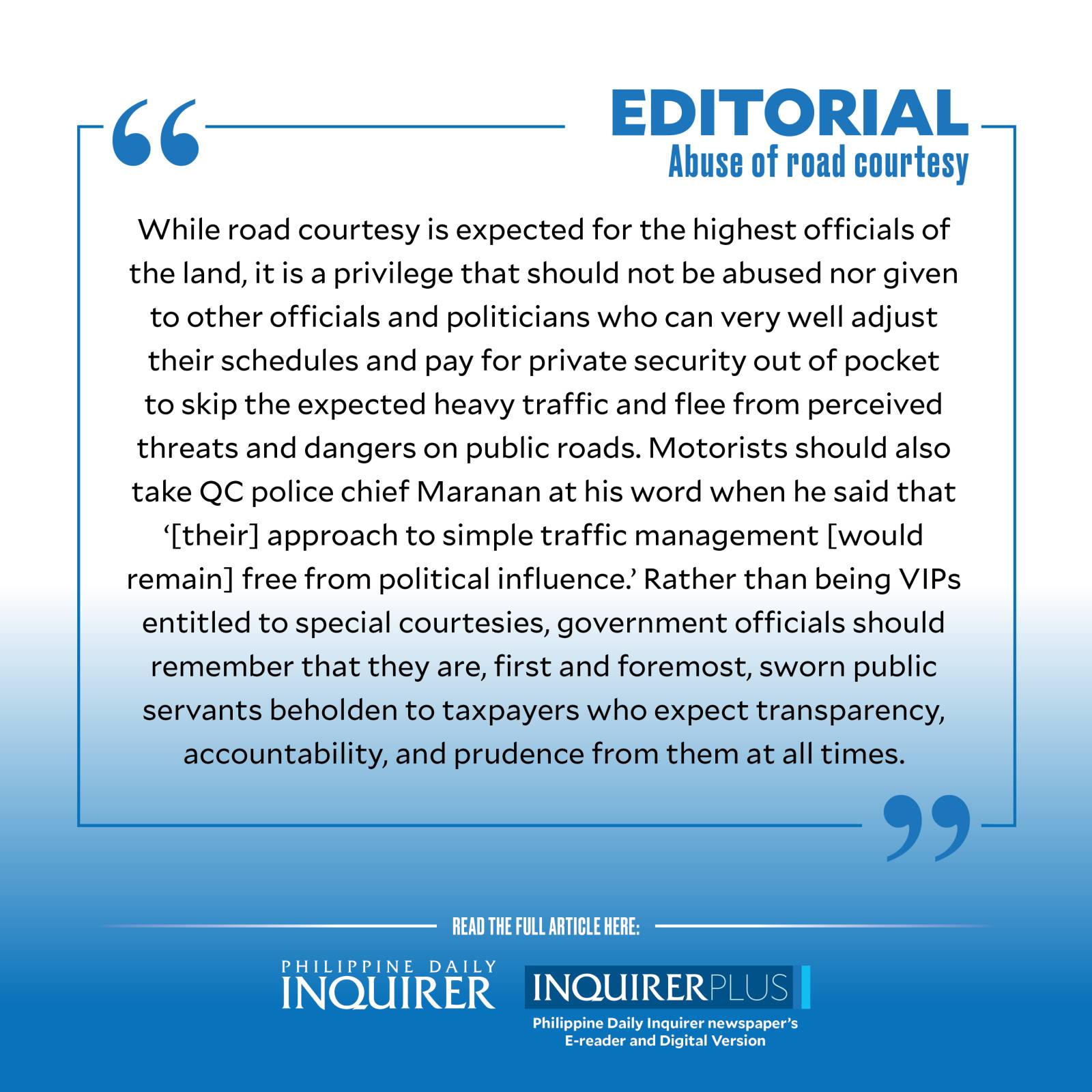
One must be incredibly thick-skinned and possessed with an extraordinary sense of entitlement not to squirm at the sight of thousands of motorists being stopped as a portion of a major thoroughfare is temporarily closed to allow a “VIP” to pass through.
This shameless act (more colorful in the vernacular term “walang hiya’’) is a slap in the face of majority of Filipinos who have to spend several hours each day stuck in the Metro’s perennial and unsolved traffic gridlocks.
It does not help that a week after Vice President Sara Duterte denied being the VIP for whom a stretch of Commonwealth Avenue in Quezon City (QC) was closed to allow a favored individual traffic-free access, the police have so far refused to name the personality involved.
Earlier, QC Police Station 14 commander Police Lt. Col. May Genio explained that the Vice President was dragged into the issue after the traffic cop misheard and mentioned the word “VP”—instead of “VIP”—in explaining the road closure to affected motorists.
After the Office of the Vice President revealed that the official, also concurrently the education secretary, was in fact in Mindanao on that particular day for activities related to World Teachers’ Day, QC police chief Brig. Gen. Redrico Maranan apologized to the VP and announced the relief of Executive Master Sgt. Verdo Pantallano, the police officer involved in the road closure. Amid the outrage over the traffic operation, the police chief on Friday stressed that it “was not, in any manner, related to politics.”
His refusal to reveal the name of the accursed VIP, however, only bolstered speculations that a big politician had invoked the road courtesy. Instead of identifying the favored person, the police had threatened to go after the citizen who uploaded the now viral video of the traffic chaos in the wake of the road closure, as if public disclosure of what was perceived as an irregularity were a crime.
And why dismiss someone for “simply doing his job,” QC Mayor Joy Belmonte had asked, after Metropolitan Manila Development Authority (MMDA) acting chair Romando Artes stated that giving courtesy to VIPs using public roads is normal. Noting that the MMDA, the overall traffic arbiter in the metro, had not relieved any of its personnel after the incident, Belmonte asked the QC police chief to reinstate Pantallano.
As he should be. The lowly traffic cop was presumably only acting on his superior’s order, so why should he bear the brunt of the entire fiasco?
Indeed, giving VIP treatment to politicians, celebrities, and affluent personalities is nothing new in these parts. So abused was this traffic-free privilege that former president Benigno Aquino III was constrained during the early part of his term to ban the use of sirens (“wang-wang”) and blinkers on city streets for VIPs and their convoy, even if his position allowed it. The ban was widely applauded and indicated the people’s disdain for VIPs flaunting their entitlement with utter disregard for public convenience, not to mention safety. Recall that Commonwealth Avenue, where the traffic operation was conducted, is also known as the killer highway for its heavy and unmanageable traffic that have often resulted in fatal road accidents.
But aye, there’s the rub. While the assurance of a traffic-free drive in notoriously choked Metro Manila roads is a courtesy given the president, vice president, and visiting foreign dignitaries, there are ways to manage this—like zipper lanes and closing down only specific roads instead of an entire wide avenue. Considering how often such courtesy is given VIPs, shouldn’t the MMDA have developed a safer, more reasonable traffic management plan by now?
This would avoid inconveniencing thousands of motorists and wage-earners who have the same right to use public roads, and in fact pay taxes to maintain them. A 2018 study by the Japan International Cooperation Agency said that traffic costs the Philippines P3.5 billion in “lost opportunities” every day, with the loss expected to triple by 2030. This loss translates to hefty deductions in the daily minimum wage of workers who are often penalized for reporting late to work because of a delay in their commute.
While road courtesy is expected for the highest officials of the land, it is a privilege that should not be abused nor given to other officials and politicians who can very well adjust their schedules and pay for private security out of pocket to skip the expected heavy traffic and flee from perceived threats and dangers on public roads.
Motorists should also take QC police chief Maranan at his word when he said that “[their] approach to simple traffic management [would remain] free from political influence.” Rather than being VIPs entitled to special courtesies, government officials should remember that they are, first and foremost, sworn public servants beholden to taxpayers who expect transparency, accountability, and prudence from them at all times.